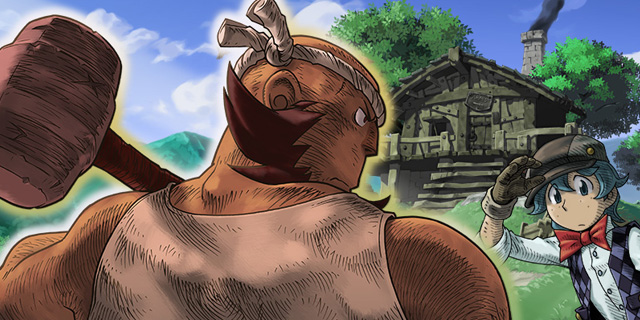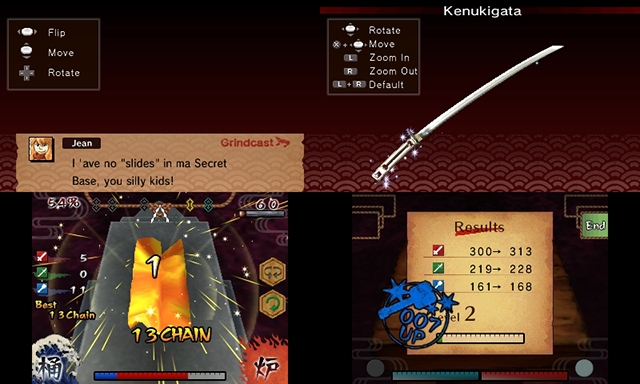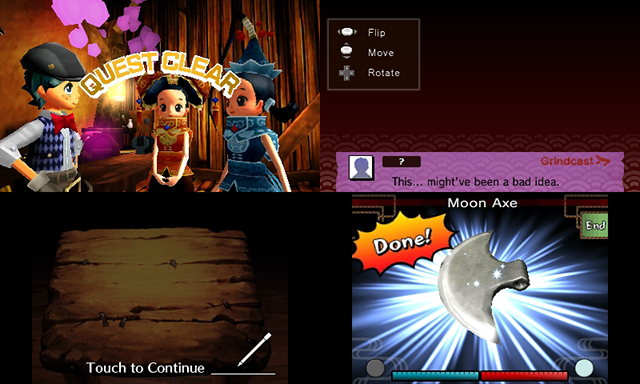
The world of the Japanese RPG is home to tons of tropes and elements ripe for parody, and putting a game in this setting without playing the role of the traditional hero is a space that’s been increasingly explored. The Atelier series has been joined by Recettear and Hometown Story in running in-game item shops, but Weapon Shop de Omasse is the first to build a game on the experience of being the trusty blacksmith. The result is something that feels totally different from RPGs themselves, but still hinges its appeal on long-time fandom of the genre.
Of all of Level-5’s Guild series releases, Weapon Shop de Omasse was always the least likely to be localized. The sheer amount of text is certainly rivaled by peer release Crimson Shroud, but Omasse goes one step further: it’s a comedy game. Translating jokes is never easy, and the work of Yoshiyuki Hirai is distinctly Japanese in taste and format. After being passed over when its fellow Guild01 games made the jump, it arrives now as a bit of a surprise. That time may have been spent on getting the tone right, as once you accept the game’s quirks, you really can feel at home with the odd cast of characters.
You’re placed in the shoes of a young apprentice, learning from an experienced blacksmith as you fulfill orders for customers that range from the seemingly-stereotypical to downright bizarre. Each main client has a story to tell, and you help them along by forging the right weapon for the quest. Mixed in with these are NPCs, intentionally labeled as such and serving to give you more opportunities to care for (and profit from) your creations. The twist here is that you’re not selling weapons, but rather renting them, and you only get paid (and get the weapon back) if the customer successfully completes the quest. This sets a premium on making sure the various heroes are prepared for their tasks.

The moment-to-moment gameplay of Omasse is definitely peculiar, and best described as a working-while-checking-Twitter simulator. Forging weapons is a multi-step process. First, you pick the weapon you want to create and the materials you want to use to enhance its attributes. This gets more complicated as the game progresses, and more experience and success will give you a larger (and stronger) pool of base weapons to use.
Second, you hammer out the shape with a rhythm-based touch-screen challenge. Hitting the beat better means higher stats, but you’ll also have to make sure to spread around your strikes and keep the metal’s temperature within a certain threshold by applying heat or cooling it in water. The rhythm part gets easier after a while, as there are only a handful of songs and the beats stay relatively consistent. The temperature thresholds get narrower as item quality increases, and longer weapons do require moving around the molten slab to position it on-screen to hit. The game explains the basics of these things, but making truly strong weapons requires a bit of exploration on your own.
All while this is happening, those who have rented your weapons are sending back messages through the Grindcast, a Twitter-like feed that details their actions and the turn-by-turn events of their battles. These pop up on the top screen while you work on everything else, and you can go to the Grindcast option in the menu to see a full list of messages and read back on what you’ve missed. This is where the massive wall of text kicks in; it couldn’t have been an easy task to translate all of these quips and lines. Following clients’ battles will show you if you forged a good weapon, but more importantly, it will flesh out the characters’ stories beyond what they wish to discuss with you when they walk in the shop door. Each narrative arc has its own quirk, making you really want to see just how it plays out. Interspersed with quest chatter are various one-liners from unknown sources, which RPG nuts should find chuckle-worthy.

Without the humor to drive things, the base gameplay would definitely get repetitive and stale quickly. It generally gets there anyway before the end of your quest, but the localization effort does an admirable job of translating the appeal. You’ll need a high tolerance for quirk; scenes feel closest to an old, filmed-in-front-of-a-studio-audience sitcom, with laugh tracks and punchlines aplenty. Combining the two elements is what works best; like watching a reality show while taking care of household tasks or listening to a podcast while walking from place to place, the engaging elements of one help to compensate for the weak aspects of the other. The only other game that comes to mind with a similar mix is Papers, Please, but the aims here are different: that game wants to make you think, and this one’s satisfied with merely making you laugh.
Like all Guild titles, Omasse is meant as a smaller, more concentrated sort of experience, though it’s definitely one of the longer ones: a playthrough clocks in at around nine hours. There’s a little bit more to explore once things are complete, but it’s certainly not meant for multiple runs. That’s okay, though, as the comedy would likely fall flat when repeated, and the core mechanics are largely played-out after the first time through.
If you’ve enjoyed the fresh, episode-scale ideas of games like Attack of the Friday Monsters! and The Starship Damrey, Weapon Shop de Omasse will appeal to you in much the same way. It’s weird. It’s very weird. And that’s probably why you’ll like it.
Pros: Successful localization of humor, interesting story arcs
Cons: Quickly-repetitive mechanics, somewhat narrow appeal



















